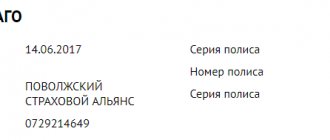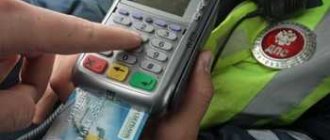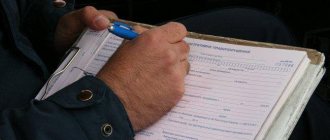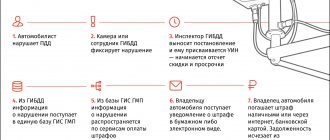FSSP debt check
The most objective way to find out your debt in enforcement proceedings is to personally contact the bailiffs. To do this, you need to know in which department the case is being conducted, which of the FSSP officials is authorized to provide such information. If you have not received a court summons or order to initiate proceedings, you may miss the time to appeal and the deadline for voluntary repayment of the debt.
In addition to a personal visit to the bailiffs, you can check the debt of the FSSP of Russia through online services. Depending on the nature of your obligations, you may:
- look at the FSSP's debt on fines on the traffic police website;
- clarify information about initiated proceedings through the database of debtors on the FSSP website;
- check for a ban on registration actions with the traffic police, which may also indicate the presence of debts;
- clarify the existence of restrictions on traveling abroad, which are introduced in enforcement proceedings.
In order not to search for information on different portals, filling out many forms, you can use the online services on our website. You can check the FSSP debt by last name, TIN, date of birth, and other data. Information about debt will be fully consistent with official data from government agencies.
How to get a car seized for fault?
So, first, let's look at the simplest method - if you have a car VIN code, then the question of how to check the presence of arrests from bailiffs using it can be most easily resolved through the official website of the traffic police.
The determination algorithm is simple:
1. Go to the official page of the traffic police check service.рф/check/auto and enter the vehicle VIN in the required field.
2. Now go down a little further on the page to the last block “Checking for restrictions” and click on the “request verification” link.
3. Enter the numbers from the picture, if required (the site does not always request verification) and based on the search result, it will show you information about the presence of restrictions on the car’s VIN.
Please note that arrest is one type of security measure; there is also a registration ban and others. And in this block you need to find data with the word “arrest”.
Below we will look at what to do if security measures are found and what they threaten. In the meantime, there are a few more ways to find out about an arrest: by the license plate number and surname of the car owner.
You will also be interested in:
- Is it possible and how to buy a credit car correctly?
- How to check a car for collateral before buying using VIN and license plate number online?
- I bought a car, but there are fines on it - what to do and what are the consequences?
How to find out your debt
Debt in the FSSP is reflected in official databases immediately after the initiation of enforcement proceedings. The bailiff makes the corresponding decision at the request of the claimant and sends the document to the participants in the case. Failure to receive a resolution does not relieve you from the obligation to repay the debt. Therefore, having received information about the debt in a timely manner, you can quickly pay it off, prevent or remove seizure of property, unblock accounts and cards, and avoid other problems.
Find out debt by last name
One of the mandatory identifiers of a person’s identity is the last name. This data is also used when issuing writs of execution and initiating proceedings in the FSSP. To find out the debt by last name through our service, you also need to know the first name. The form also contains information about the region. It is advisable to indicate the date of birth to exclude coincidences with namesakes.
Search for debt by TIN
For legal entities, one of the required identifiers is the TIN. To check the debt of an enterprise to the FSSP, you need to find out its exact name using the TIN. Such data is available on the tax service website. The name of the organization and the region of its activities must be indicated in the form on our website, and data on current debts under enforcement proceedings must be obtained.
You can only obtain information about debts on taxes and fees. Searching for debt by TIN is possible through the taxpayer’s Personal Account. This information may not coincide with the Bailiffs Database, since the FSSP debt can only be found out through the website based on initiated enforcement proceedings.
View debt
Through our services or on the bailiffs’ website, you can not only check the FSSP debt, but also control its repayment. After withholding any amount, bailiffs are required to make appropriate changes to the Debtors Database. This information may not be updated immediately, but may take several days. If quite a lot of time has passed since the payment (for example, several weeks), and the previous debt is still in the Database, demand clarification from the bailiff, or appeal their actions.
Check your debt with the FSSP
How to find out the debt if you know for sure that enforcement proceedings have been initiated, but online services do not provide information? This is possible if the bailiffs did not enter information into the Debtors Database, or mistakenly indicated another person there. In this case, you can find out the debt to the bailiffs through the official in charge of the case.
On our website you can find contact and address information, telephone numbers of all departments and divisions of the FSSP. This information can be used to send a written request or personally contact the bailiffs. It is impossible to find out the debt by calling the FSSP, since this does not allow identifying the person. When applying in person, you must not only be informed about all the proceedings initiated, but also be given the opportunity to familiarize yourself with the case. All necessary statements can be found on our website.
What should I do if my car is seized?
First of all, understand and find out why the car was seized. Further actions will depend on this.
Most often, the reason for the arrest becomes clear from the data from the bailiffs’ website. You can also go to it when checking the arrest results on the traffic police website - simply by clicking on the link with the production number (if there is one):
If imposed legally
If the measure is imposed legally, and you really have debts to the state or third parties, then all that remains is to pay them. There are no other ways to avoid arrest.
Please note that it is best to pay directly to the bailiffs, and not to the traffic police (in case of fines) or using the specified details (in case of civil debts).
Something else useful for you:
- What are the changes to traveling abroad with debts since October 2017?
- Application "Euro Accident Report" - how to officially register an accident over the phone?
- Is it possible and how to check whether a road sign has been installed legally?
If illegal
Then you need to contact the bailiff with your passport with a written complaint about illegal security measures. Such a complaint is written in free form.
Unfortunately, in most cities, departments have rather narrow opening hours, and you will have to wait in lines. But alas, there is no other way out!
If there is no response to the executor’s complaint, it is necessary to forward it, along with the complaint now against the executor, to the senior bailiff of the department.
Unfortunately, in 2021, the bailiffs’ website does not allow filing any of the above complaints online.
Find out your FSSP debt through our website - quickly and conveniently!
You can check your debt through the FSSP of Russia website, but this information will be incomplete. Only our services provide the opportunity to verify that there are no traffic police fines and to check the prohibitions and restrictions imposed on the debtor. What’s even more convenient is that you can pay off your debt immediately without visiting the bank or bailiffs. For all questions that arise, our lawyers will provide a free consultation, explain the procedure in enforcement proceedings, and the rules for filing complaints against FSSP officials.
Find out your debt right now! To do this, it is enough to indicate your last and first name, region of residence and date of birth. We guarantee the confidentiality of the information you provide in the search form.
What debts can be checked using the bailiff database?
Verification of debts based on the FSSP is carried out for all enforcement proceedings initiated against a citizen, organization or individual entrepreneur. The FSSP can check for debts:
- on loans and microloans;
- under receipts, loan agreements from individuals and organizations;
- on overdue housing and communal services, contributions for major repairs;
- on taxes, fees and penalties collected by the Federal Tax Service of Russia;
- for administrative fines, including for violation of traffic rules;
- for personal debts of individuals (alimony, compensation for harm and damage, other obligations).
Material on the topic
How to avoid paying bailiffs? Legal advice
If you haven't paid your loan for a long time, then...
The database includes debts collected under judicial acts, decisions of government bodies and officials. If the writ of execution for the debt was not transferred to the FSSP, there is no information about it in the database.
What can a bailiff fine for?
The Office of the Federal Bailiff Service for the Tver Region explains that the bailiff has the right, in accordance with the requirements of current legislation, to impose penalties on a citizen as provided for in the Administrative Code.
Thus, in 2015, Tver bailiffs compiled more than 1,300 materials.
In accordance with Part 1 of Art. 113 of the Federal Law “On Enforcement Proceedings”, for failure by citizens or officials to comply with the legal requirements of the bailiff and violation of the legislation of the Russian Federation on enforcement proceedings, the bailiff imposes a fine on the guilty person in the manner and amount established by the legislation of the Russian Federation on administrative offenses .
Thus, administrative liability is provided for under Art. 17.14. Code of Administrative Offenses of the Russian Federation “Violation of the legislation on enforcement proceedings”, expressed in: - failure to comply with the legal requirements of the bailiff, both by the debtor and by a person who is not a party to the enforcement proceedings (In providing false information about one’s rights to property, in failure to report dismissal from work, about a new place of work, study, place of receipt of a pension, other income or place of residence. Failure of a bank or other credit organization to comply with the requirement contained in the executive document.)
When these facts are established, the bailiff has the right to decide on the application of penalties established by the legislation of the Russian Federation.
Art. 17.15 of the Code of Administrative Offenses of the Russian Federation “Failure to comply with non-property requirements contained in a writ of execution”: - within the period established by the bailiff, after the issuance of a decision to collect the enforcement fee; - within the period newly established by the bailiff after the imposition of an administrative fine.
According to Part 1 of Art. 20.25 of the Code of Administrative Offenses of the Russian Federation “Failure to pay an administrative fine or unauthorized abandonment of the place of serving an administrative arrest” provides for liability for failure to pay an administrative fine within the period prescribed by the Code of Administrative Offenses of the Russian Federation.
Thus, from the moment the decision is received, 10 days are given to appeal it. If the decision is not appealed, then from the 11th day there are 30 days to pay the fine, but if the fine is not paid within the specified period, then within 3 months the driver may be charged under Part 1 of Art. 20.25 Code of Administrative Offenses of the Russian Federation.
Citizens and officials should not forget that the penalties are severe.
Thus, the amount of an administrative fine imposed by a bailiff on a citizen can range from 1 to 2.5 thousand rubles, an official risks paying from 10 to 20 thousand rubles, and a legal organization - from 30 to 100 thousand rubles.
Any citizen can obtain information about the presence or absence of debt on the official website of the Federal Bailiff Service of Russia for the Tver Region in the section “Data Bank of Enforcement Proceedings” - https://r69.fssprus.ru/iss/ip/ and by paying the debt on time, be sure that no penalties will be applied to him.
Grounds for seizure of property by bailiffs
According to paragraph 1 of Art. 80 Federal Law No. 229 “On Enforcement Proceedings”, the debtor’s property may be seized within the framework of enforcement proceedings under enforcement documents containing demands for property penalties or for the seizure of property. Property collections are overdue debts: loans, fines, alimony, taxes. The presence of such a document on execution gives the bailiff the right to seize the identified property if there is a debt in excess of 3 thousand rubles.
The use of this measure by the bailiff is permissible both at the request of the claimant and on his own initiative. The bailiff must be guided by clause 2 of Art. 69 Federal Law No. 229 and seize property only within the amount of the claimant’s claims, applying the principle of proportionality of the seizure.
Note!
It will be proportionate only when the value of the seized property is comparable to the volume of penalties. Otherwise, it is only possible if the bailiff is unaware of the debtor’s other property or if it is missing.
Grounds for arrest may arise even before the commencement of proceedings - within the framework of judicial proceedings as a measure of enforcement. Its imposition is allowed before the court actually makes a decision on the case, if the court has reason to believe that in the future the execution of the court decision will be difficult, according to paragraph 2 of Art. 139 Code of Civil Procedure.










